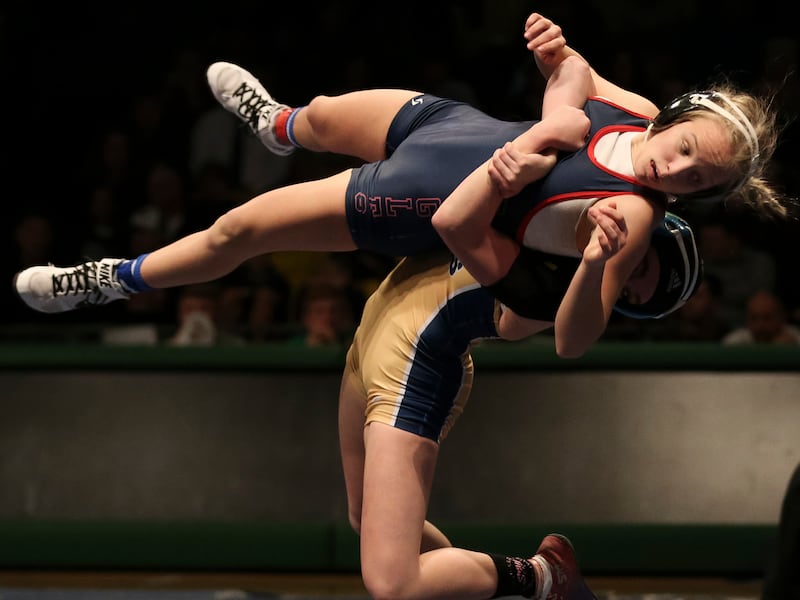MIDVALE — Utah girls will have a league of their own this winter — a wrestling league, that is.
On Thursday, girls wrestling was officially sanctioned by the board of trustees of the Utah High School Activities Association. Two other sports — coed competitive cheer and boys volleyball — were not sanctioned.
While coed competitive cheer failed by a vote of 6-5 after coaches said they’d prefer the sport not be sanctioned until they could work out a few issues, the UHSAA Board of Trustees didn’t even vote on boys volleyball.
“We get why they didn’t (sanction volleyball), and we’re working on building a partnership with the UHSAA,” said Jill Davis, Utah Boys Volleyball Association co-founder and president, who made a presentation to the board Thursday morning on behalf of boys the high school club volleyball program.
“It’s not an adversarial relationship. ... We’ve done our homework, and we truly feel like we qualify on multiple fronts. We’ve done the best we can to show that this is a healthy sport, not a niche sport, and we’re going to go on forever, regardless of what happens.”
Davis said the UBVA sees the work it’s done, including presenting to the emerging sports committee last November and the board of trustees Thursday, which was a meeting that was originally scheduled for March but was postponed due to COVID-19 restrictions.
“We just feel like the UHSAA can take us farther, and that’s why we said we’d gladly turn the league over to them,” Davis said. “But we really do appreciate what they’re dealing with, and it’s a complicated, multifaceted situation.”
Tom Sherwood, a member of the trustees and principal at Brighton High, said none of the members forced a vote on boys volleyball because the timing isn’t right, even though most of them support the sport.
“We just had our first season with lacrosse, and to add another spring sport, that would make nine spring sports,” Sherwood said. “That’s a lot to keep track of, and it’s definitely not dead. It was proposed to discuss it in November.”
He said most members are fans of the sport, if they can find resources to offer it through the high school.
“It’s a great sport,” Sherwood said.
As for coed competitive cheer, Lori Rupp, who presented the cheer coaches association, said they don’t want to be sanctioned because they feel they have some work to do before they can transition from club status to a full-fledged sanctioned, competitive sport.
“At this point, we are asking to not be sanctioned,” said Rupp, who has been involved with the association for decades with both drill team and competitive cheer. “We want to work on transitioning into that so it’s a positive educational environment. ... If we transition too early, it’s not going to be successful.”
Rupp said she understood the desire to sanction, as the sport has enough numbers and is really already an integral part of the school community.
“We do have an organized coaches association, but it’s not 100%,” she said, noting 2023-24 school year is a much more realistic target date. “With all the other things cheer does, we have to make sure we’re very definitive about how we approach this. ... The last thing we want is a competitive team in the school and a sideline team that goes to games. That’s not good for the sport.”
Sherwood led the opposition in following the executive committee’s unanimous recommendation to sanction rather than Rupp’s plea for several more years as a club sport. He said association executive director Rob Cuff was concerned that they may not have the staff to stage a competitive cheer state championship this winter because they’re waiting to see the budget impacts of COVID-19.
The emerging sports subcommittee, headed by Jan Whittaker, will likely discuss coed competitive cheer when it meets again in November. Sherwood hopes that after they know their financial situation, they can find a way to sanction the sport. He said the student-athletes who participate are “representing our schools, riding buses, and we’re accepting fees across our counters.”
“The bigger issue to me is with the new fee waiver system, we have to account for every fee we charge across out counters,” Sherwood said. “A lot of schools are running these club programs through the school, and the Utah State Board of Education expects us to waive fees for competition cheer, if necessary, even though it’s not sanctioned. I just don’t know how that relationship is going to continue.”
He said the teams operate as part of the school right now, but they’re run by private coaches.
“If we continue with these competitions as a club sport, that money used to pay for those competitions (is) going to private entities, but yet is has to be waived,” Sherwood said, noting the private cheer groups rent high school gyms, and those could be paid for with fees that may be generated by fee waivers if they apply the state board rules to the sport. “Fee waived funds are going to go into private pockets.”
Sherwood said several people had to leave the meeting, part of which was held virtually, before the vote, and that may have cost the association a few votes for sanctioning.
Whittaker said the association will conduct an interest survey this fall, and based on that, start the entire process of looking at what sports are offered and what should be considered for sanctioning over again in November.
Wrestling will offer the same 14 weight classes to both boys and girls, a decision that is made by the National Federation of State High School Sports. When trustee Stan Young pointed out that the upper weight classes might be difficult for girls teams to fill, especially for smaller schools, associate director Brennan Jackson said the national federation would likely revisit it in the future.
“I think with the COVID-19 concerns, they just didn’t have time to deal with this issue,” he said.


